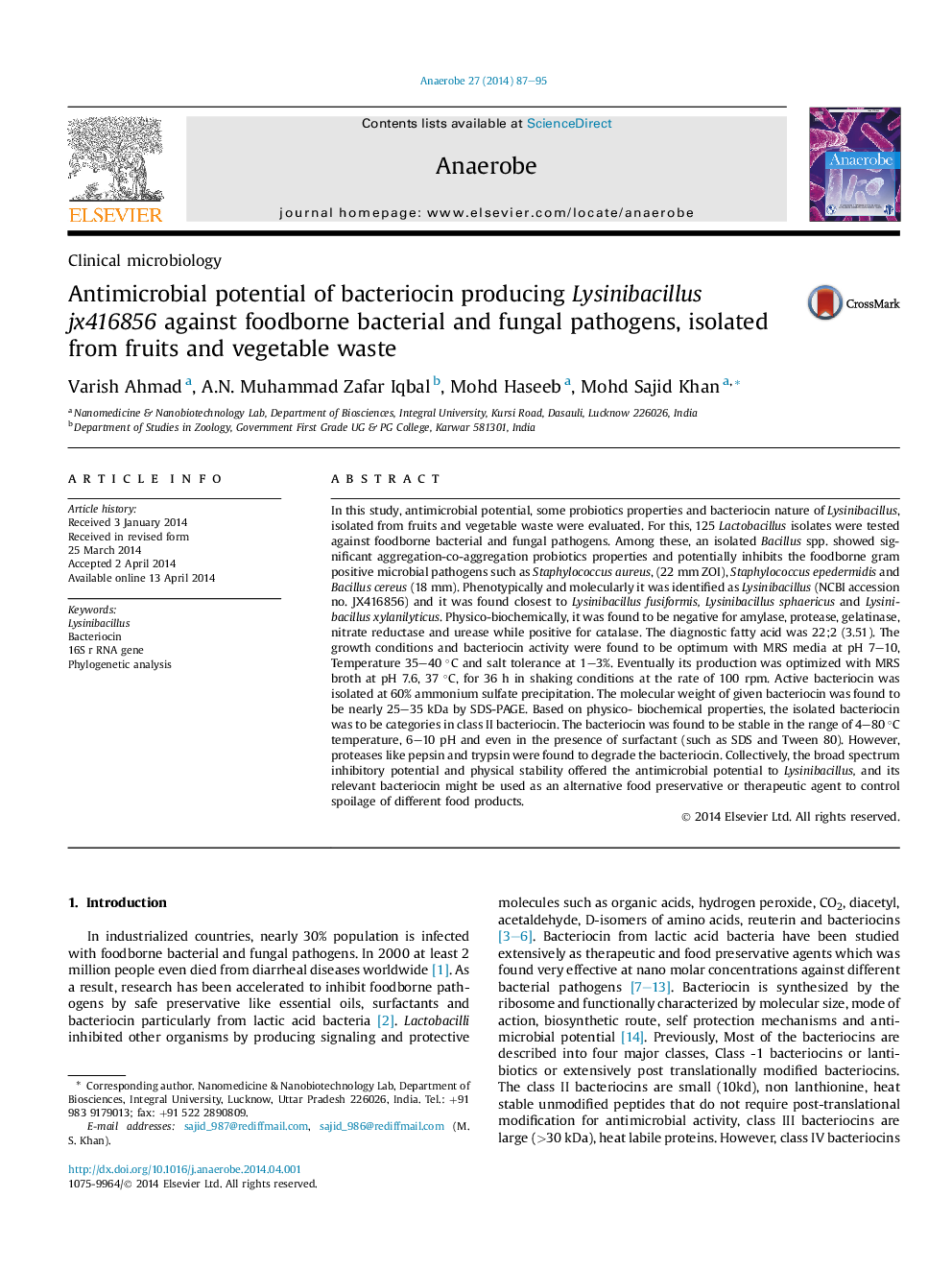| کد مقاله | کد نشریه | سال انتشار | مقاله انگلیسی | نسخه تمام متن |
|---|---|---|---|---|
| 6128648 | 1592836 | 2014 | 9 صفحه PDF | دانلود رایگان |
عنوان انگلیسی مقاله ISI
Antimicrobial potential of bacteriocin producing Lysinibacillus jx416856 against foodborne bacterial and fungal pathogens, isolated from fruits and vegetable waste
دانلود مقاله + سفارش ترجمه
دانلود مقاله ISI انگلیسی
رایگان برای ایرانیان
موضوعات مرتبط
علوم زیستی و بیوفناوری
ایمنی شناسی و میکروب شناسی
میکروب شناسی
پیش نمایش صفحه اول مقاله

چکیده انگلیسی
In this study, antimicrobial potential, some probiotics properties and bacteriocin nature of Lysinibacillus, isolated from fruits and vegetable waste were evaluated. For this, 125 Lactobacillus isolates were tested against foodborne bacterial and fungal pathogens. Among these, an isolated Bacillus spp. showed significant aggregation-co-aggregation probiotics properties and potentially inhibits the foodborne gram positive microbial pathogens such as Staphylococcus aureus, (22 mm ZOI), Staphylococcus epedermidis and Bacillus cereus (18 mm). Phenotypically and molecularly it was identified as Lysinibacillus (NCBI accession no. JX416856) and it was found closest to Lysinibacillus fusiformis, Lysinibacillus sphaericus and Lysinibacillus xylanilyticus. Physico-biochemically, it was found to be negative for amylase, protease, gelatinase, nitrate reductase and urease while positive for catalase. The diagnostic fatty acid was 22;2 (3.51). The growth conditions and bacteriocin activity were found to be optimum with MRS media at pH 7-10, Temperature 35-40 °C and salt tolerance at 1-3%. Eventually its production was optimized with MRS broth at pH 7.6, 37 °C, for 36 h in shaking conditions at the rate of 100 rpm. Active bacteriocin was isolated at 60% ammonium sulfate precipitation. The molecular weight of given bacteriocin was found to be nearly 25-35 kDa by SDS-PAGE. Based on physico- biochemical properties, the isolated bacteriocin was to be categories in class II bacteriocin. The bacteriocin was found to be stable in the range of 4-80 °C temperature, 6-10 pH and even in the presence of surfactant (such as SDS and Tween 80). However, proteases like pepsin and trypsin were found to degrade the bacteriocin. Collectively, the broad spectrum inhibitory potential and physical stability offered the antimicrobial potential to Lysinibacillus, and its relevant bacteriocin might be used as an alternative food preservative or therapeutic agent to control spoilage of different food products.
ناشر
Database: Elsevier - ScienceDirect (ساینس دایرکت)
Journal: Anaerobe - Volume 27, June 2014, Pages 87-95
Journal: Anaerobe - Volume 27, June 2014, Pages 87-95
نویسندگان
Varish Ahmad, A.N. Muhammad Zafar Iqbal, Mohd Haseeb, Mohd Sajid Khan,